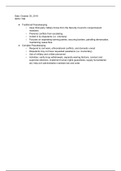All 16 résultats
Trier par
Résumés les plus vendus pour Essentials of International Relations
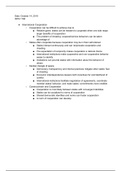
-
International Cooperation
- Notes de cours • 1 pages • 2019 Très apprécié
-
Disponible en pack
-
- 8,09 €
- + en savoir plus
Describes how states cooperate and the problems associated with international cooperation. Explains the Kantian triangle of peace, and explains how the major motivating factor for international cooperation among states is self-interest. Defines relative gains and democracy.
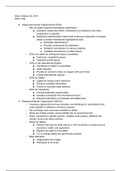
-
Intergovernmental Organizations and Nongovernmental Organizations
- Notes de cours • 2 pages • 2019 Très apprécié
-
Disponible en pack
-
- 8,09 €
- + en savoir plus
Describes the characteristics of intergovernmental and nongovernmental organizations (IGOs and NGOs), how each operates at the international and state levels, and compares how the three major theoretical perspectives (liberalism, realism, constructivism) view IGOs and NGOs.
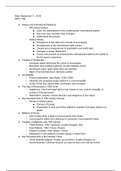
-
History and International Relations
- Notes de cours • 2 pages • 2019 Très apprécié
-
Disponible en pack
-
- 8,09 €
- + en savoir plus
Explains how history relates to the study of international relations and why it is important to study history in order to fully understand international relations. Identifies and explains significant historical events that have had a lasting impact on the field of international relations. Defines sovereignty, legitimacy, nationalism, the arms race, glasnost, and perestroika. Covers historical time periods from the Treaties of Westphalia in 1648 to the era after the Cold War.
Est-ce que vous écrivez vous-même des résumés ? Mettez-les ensuite en vente et gagnez de l'argent à chaque achat de vos documents.
Explains traditional peacekeeping and complex peacekeeping
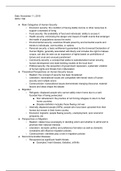
-
Human Security, Migration, Health
- Notes de cours • 2 pages • 2019 Très apprécié
-
Disponible en pack
-
- 8,09 €
- + en savoir plus
Identifies the seven categories of human security and provides a definition/description for each: economic, food, health, environmental, personal, community, and political. This document also explains human security issues and migration from the three main theoretical perspectives (realism, liberalism, constructivism). Describes noncommunicable diseases and identifies examples. Defines refugees, internally displaced people (IDPs), and economic migrants.
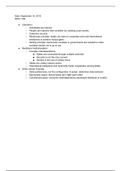
-
Liberal Theories
- Notes de cours • 1 pages • 2019 Très apprécié
-
Disponible en pack
-
- 8,09 €
- + en savoir plus
Provides descriptions and characteristics of liberalism, neoliberal institutionalism, and general characteristics of other liberal theories. Defines reciprocity principle, identity principle, complex interdependence, democratic peace, and commercial peace.
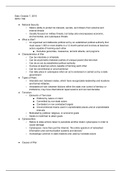
-
Security, War and Warfare, Terrorism
- Notes de cours • 2 pages • 2019 Très apprécié
-
Disponible en pack
-
- 8,09 €
- + en savoir plus
Describes national security, types of wars, characteristics of war, elements of terrorism, cyberwarfare, the causes of war, deterrence, jus ad bellum, and jus in bello. Defines war, interstate war, intrastate/civil war, terrorism, cyberwarfare, cyberspace, deterrence, jus ad bellum, and jus in bello.
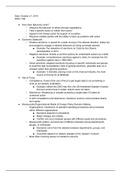
-
Statecraft and Foreign Policy Decisions
- Notes de cours • 3 pages • 2019 Très apprécié
-
Disponible en pack
-
- 8,09 €
- + en savoir plus
Describes economic statecraft, use of force, and the models of foreign policy decision making: bureaucratic/organizational, pluralist, rational, and constructivist. Defines positive sanctions, negative sanctions, smart sanctions, compellence, deterrence, globalization, transnational movements, ethnonational movements, transnational crime, and fragile states.
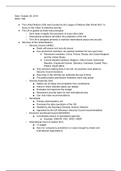
-
The United Nations
- Notes de cours • 1 pages • 2019 Très apprécié
-
Disponible en pack
-
- 8,09 €
- + en savoir plus
Identifies each part of the United Nations: Security Council, General Assembly, Secretariat, Economic and Social Council, and International Court of Justice. Describes characteristics of each part, including: the permanent and nonpermanent members of the Security Council, the abilities of each body, and the general areas (i.e. peace, security, etc) each body deals with.
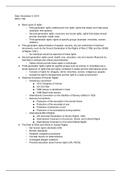
-
Human Rights
- Notes de cours • 2 pages • 2019 Très apprécié
-
Disponible en pack
-
- 8,09 €
- + en savoir plus
Explains the basic concepts of human rights, the historical evolution of human rights, the roles that IGOs and NGOs play in human rights, the increase of women's rights as human rights, and Responsibility to Protect (R2P). Defines first-generation rights, second-generation rights, third-generation rights, and Responsibility to Protect.
Derniers résumés de Essentials of International Relations

-
Statecraft and Foreign Policy Decisions
- Notes de cours • 3 pages • 2019 Nouveau
-
Disponible en pack
-
- 8,09 €
- + en savoir plus
Describes economic statecraft, use of force, and the models of foreign policy decision making: bureaucratic/organizational, pluralist, rational, and constructivist. Defines positive sanctions, negative sanctions, smart sanctions, compellence, deterrence, globalization, transnational movements, ethnonational movements, transnational crime, and fragile states.
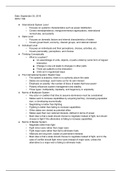
-
Levels of Analysis
- Notes de cours • 3 pages • 2019 Nouveau
-
Disponible en pack
-
- 8,09 €
- + en savoir plus
Explains the international, state, and individual levels of system analysis. Defines and explains the parts of a system and how a system works. Explains multipolarity, bipolarity, and unipolarity. Provides arguments as for why each type of polarity (multipolar, bipolar, unipolar) should be the most stable. Explains change in the international system through the lenses of realism, liberalism, and constructivism. Explains state power. Defines system, tight bipolarity, loose bipolarity, power, natu...

-
Intergovernmental Organizations and Nongovernmental Organizations
- Notes de cours • 2 pages • 2019 Nouveau
-
Disponible en pack
-
- 8,09 €
- + en savoir plus
Describes the characteristics of intergovernmental and nongovernmental organizations (IGOs and NGOs), how each operates at the international and state levels, and compares how the three major theoretical perspectives (liberalism, realism, constructivism) view IGOs and NGOs.
Est-ce que vous écrivez vous-même des résumés ? Mettez-les ensuite en vente et gagnez de l'argent à chaque achat de vos documents.

-
Security, War and Warfare, Terrorism
- Notes de cours • 2 pages • 2019 Nouveau
-
Disponible en pack
-
- 8,09 €
- + en savoir plus
Describes national security, types of wars, characteristics of war, elements of terrorism, cyberwarfare, the causes of war, deterrence, jus ad bellum, and jus in bello. Defines war, interstate war, intrastate/civil war, terrorism, cyberwarfare, cyberspace, deterrence, jus ad bellum, and jus in bello.

-
Human Security, Migration, Health
- Notes de cours • 2 pages • 2019 Nouveau
-
Disponible en pack
-
- 8,09 €
- + en savoir plus
Identifies the seven categories of human security and provides a definition/description for each: economic, food, health, environmental, personal, community, and political. This document also explains human security issues and migration from the three main theoretical perspectives (realism, liberalism, constructivism). Describes noncommunicable diseases and identifies examples. Defines refugees, internally displaced people (IDPs), and economic migrants.

-
Human Rights
- Notes de cours • 2 pages • 2019 Nouveau
-
Disponible en pack
-
- 8,09 €
- + en savoir plus
Explains the basic concepts of human rights, the historical evolution of human rights, the roles that IGOs and NGOs play in human rights, the increase of women's rights as human rights, and Responsibility to Protect (R2P). Defines first-generation rights, second-generation rights, third-generation rights, and Responsibility to Protect.

-
History and International Relations
- Notes de cours • 2 pages • 2019 Nouveau
-
Disponible en pack
-
- 8,09 €
- + en savoir plus
Explains how history relates to the study of international relations and why it is important to study history in order to fully understand international relations. Identifies and explains significant historical events that have had a lasting impact on the field of international relations. Defines sovereignty, legitimacy, nationalism, the arms race, glasnost, and perestroika. Covers historical time periods from the Treaties of Westphalia in 1648 to the era after the Cold War.

-
Liberal Theories
- Notes de cours • 1 pages • 2019 Nouveau
-
Disponible en pack
-
- 8,09 €
- + en savoir plus
Provides descriptions and characteristics of liberalism, neoliberal institutionalism, and general characteristics of other liberal theories. Defines reciprocity principle, identity principle, complex interdependence, democratic peace, and commercial peace.

-
International Cooperation
- Notes de cours • 1 pages • 2019 Nouveau
-
Disponible en pack
-
- 8,09 €
- + en savoir plus
Describes how states cooperate and the problems associated with international cooperation. Explains the Kantian triangle of peace, and explains how the major motivating factor for international cooperation among states is self-interest. Defines relative gains and democracy.

-
The United Nations
- Notes de cours • 1 pages • 2019 Nouveau
-
Disponible en pack
-
- 8,09 €
- + en savoir plus
Identifies each part of the United Nations: Security Council, General Assembly, Secretariat, Economic and Social Council, and International Court of Justice. Describes characteristics of each part, including: the permanent and nonpermanent members of the Security Council, the abilities of each body, and the general areas (i.e. peace, security, etc) each body deals with.

Combien avez-vous déjà dépensé pour Stuvia ? Imaginez que vous soyez beaucoup plus nombreux à payer pour des notes d'étude, mais cette fois-ci, c'est VOUS qui vendez. Ka-ching ! Découvrez tout sur gagner de l'argent sur Stuvia

